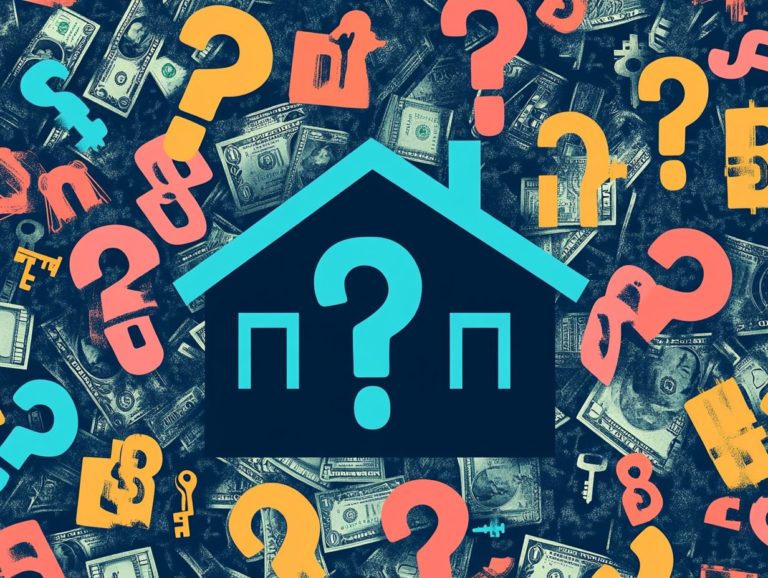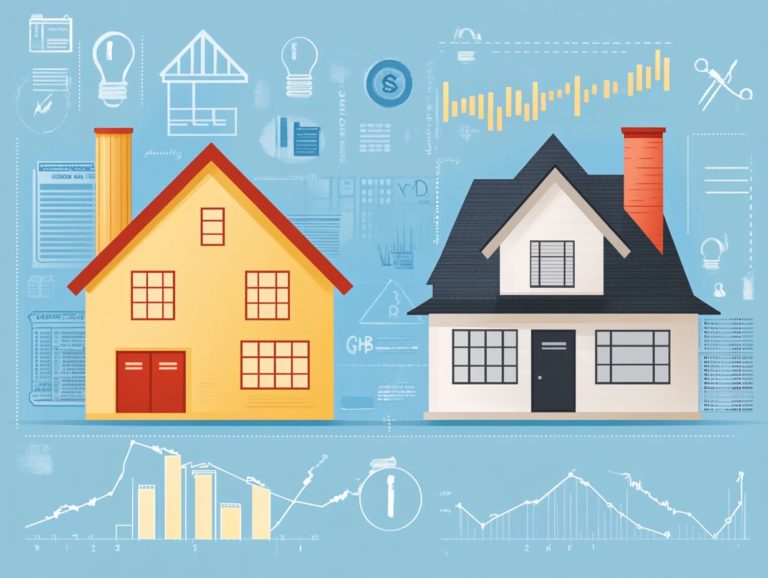5 Common Mortgage Myths Debunked
Worried about buying a home? Let s clear up some common myths first! Navigating the realm of mortgages can indeed feel daunting, particularly with the myriad of misconceptions floating around. The belief that you must make a substantial 20% down payment or that banks are the sole sources of lending can mislead aspiring homeowners and hinder their progress.
This article aims to dismantle five prevalent mortgage myths, shedding light on the truths behind them while exploring smarter alternatives. Whether you re stepping into homeownership for the first time or considering a refinance, grasping these insights will equip you with the knowledge necessary to confidently embark on your journey.
Contents
- Key Takeaways:
- 1. You Need a 20% Down Payment to Buy a House
- 2. A 30-Year Fixed Rate Mortgage is Always the Best Option
- 3. You Need Perfect Credit to Get a Mortgage
- 4. You Can Only Get a Mortgage from a Bank
- 5. Refinancing is Always a Good Idea
- What Are the Benefits of a Smaller Down Payment?
- What Are Some Other Mortgage Options for Buyers?
- What Factors Should Be Considered When Choosing a Mortgage?
- How Can One Improve Their Credit Score for a Better Mortgage Rate?
- What Are the Pros and Cons of Getting a Mortgage from a Bank?
- When Is Refinancing a Good Idea and When Is It Not?
- What Are Some Common Refinancing Mistakes to Avoid?
- How Can a Homeowner Determine If Refinancing Will Benefit Them?
- What Are Some Alternatives to Refinancing for Lowering Mortgage Payments?
- What Are Some Common Myths About Refinancing?
Key Takeaways:
- A 20% down payment is not always necessary; FHA loans allow as little as 3.5% down.
- 30-year fixed-rate mortgages may not suit everyone; evaluate your financial goals.
- Perfect credit isn’t a must; some lenders accept scores starting at 580.

1. You Need a 20% Down Payment to Buy a House
Many first-time buyers mistakenly believe that saving a 20% down payment is the only way to step onto the property ladder. This misconception can hold you back from pursuing homeownership or exploring the diverse mortgage options available in the real estate market.
In reality, there are several viable alternatives that can make homeownership much more accessible for you. For instance, FHA loans allow qualified borrowers to secure a mortgage with as little as 3.5% down. Programs like Help to Buy offer government-backed assistance to reduce your down payment burden.
By remaining open to these options, you can debunk the myth that a hefty 20% down payment is necessary. This knowledge empowers you! You can pursue your dream of owning a home without the overwhelming pressure of saving for years on end.
2. A 30-Year Fixed Rate Mortgage is Always the Best Option
While a 30-year fixed-rate mortgage is a popular choice among many homebuyers, it may not always be the best fit for you. Your unique financial situation and the ever-changing landscape of interest rates can significantly impact the mortgage options that are ideal for your circumstances.
For instance, you might be tempted by adjustable-rate mortgages mortgages where the interest rate can change over time, often starting lower than fixed-rate loans which offer lower initial interest rates. While this can lead to substantial savings during the early years of homeownership, keep in mind that these savings can be counterbalanced by future rate adjustments that may substantially increase your monthly payments over time.
Think about your job stability and income. These factors play a key role in your mortgage choice. It s crucial to carefully weigh both the potential benefits and pitfalls of each mortgage type to make an informed decision.
3. You Need Perfect Credit to Get a Mortgage
The idea that you need a flawless credit score to secure a mortgage is a common misconception that can deter many potential buyers. In reality, there are various mortgage options and lenders available that cater to different credit circumstances, including those with less-than-stellar credit.
You ll find that some mortgage lenders are open to considering credit scores starting around 580, and they often provide specialized loan products designed for such scenarios. For example, FHA loans, backed by the Federal Housing Administration, typically allow for lower scores and come with more flexible requirements.
Going through the pre-approval process can be an invaluable first step for you. It not only helps you understand your financial standing but also reveals potential mortgage offers that align with your situation. Additionally, some niche lenders focus on non-QM (Qualified Mortgage) loans, specifically designed for individuals with lower scores, proving that homeownership is very much within reach for many.
4. You Can Only Get a Mortgage from a Bank

Many prospective homebuyers often fall into the trap of thinking that traditional banks are their only option for obtaining a mortgage. This narrow view overlooks many mortgage lenders and brokers.
Additionally, specialized programs like guarantor mortgages and initiatives such as Help to Buy can pave the way to homeownership.
By exploring these alternative avenues, you can discover tailored solutions that might perfectly fit your financial situation. Mortgage brokers can be invaluable allies in your journey, connecting you with diverse lenders who may offer competitive rates and flexible terms.
Specialist lenders are also out there, ready to accommodate unique financial circumstances whether you have irregular income or a less-than-perfect credit history. This makes the dream of homeownership much more attainable.
Government initiatives can also provide essential support, offering grants or incentives specifically designed for first-time buyers. This creates opportunities that might otherwise feel just out of reach.
5. Refinancing is Always a Good Idea
Refinancing can seem like an attractive option for homeowners, especially if you’re looking to reduce your mortgage payments or secure a better interest rate. However, it’s essential to consider the closing costs and potential risks before making this significant financial decision.
You might be contemplating refinancing to take advantage of favorable market conditions, like declining interest rates, or perhaps to switch to more manageable loan terms.
Some homeowners look to convert an adjustable-rate mortgage into a fixed-rate option, providing greater payment stability over time.
Conducting a thorough cost analysis is crucial; those closing costs could easily offset any immediate savings, making the choice less advantageous.
Refinancing may not always align with your long-term financial goals, especially if you plan to sell the property soon. By understanding these dynamics, you can navigate potential traps with confidence.
What Are the Benefits of a Smaller Down Payment?
Opting for a smaller down payment can offer you numerous advantages as a first-time buyer. This allows you to step onto the property ladder sooner and explore a range of mortgage options that make homeownership more within reach.
By lowering that initial cash requirement, you can enjoy enhanced cash flow, meaning you re free to allocate funds toward renovations, furnishings, or even building up savings for future financial goals.
Many lenders provide flexible financing options, such as FHA loans, tailored for those who may not have the means for a substantial down payment. This accessibility encourages a more diverse array of people to chase their dream of homeownership.
What Are Some Other Mortgage Options for Buyers?
In addition to traditional mortgages, you’ll find an array of alternative mortgage options tailored for buyers like you. Discover the possibilities of government-assisted programs, shared ownership schemes, and specialized offerings from niche lenders.
These alternatives are designed with first-time buyers in mind, often featuring lower deposit requirements and flexible repayment terms.
For example, the Help to Buy scheme allows you to secure a loan that covers a portion of your property s value, making homeownership more accessible, even in pricey areas.
Shared ownership lets you purchase a share of a property while paying rent on the remaining portion, greatly easing your monthly financial burden.
Guarantor mortgages involve someone often a family member guaranteeing a portion of the mortgage. This helps you secure better rates, especially if your credit history or savings are limited.
Each of these options comes with its own set of eligibility criteria and conditions, catering to a variety of financial situations.
What Factors Should Be Considered When Choosing a Mortgage?

When selecting a mortgage, you have many factors to think about, such as the interest rate, your credit score, the type of mortgage lender, and the size of your down payment.
Each of these elements can significantly impact your overall financial situation. You ll want to carefully weigh the benefits of fixed interest rates, which offer stability in your monthly payments, against variable rates, which might present lower initial costs but come with the risk of future increases.
Your credit score is also important, determining both your eligibility and borrowing costs. Generally, a higher score leads to better terms.
The size of your down payment will shape the conditions of your loan, influencing interest rates and mortgage insurance requirements. To make informed decisions, it s imperative to assess your personal financial health and stay attuned to future market trends.
This way, you can choose the most suitable mortgage type, ensuring both affordability and long-term financial security.
How Can One Improve Their Credit Score for a Better Mortgage Rate?
Improving your credit score is pivotal for securing a better mortgage rate, especially if you re starting with bad credit. By understanding the steps to enhance your creditworthiness, you can unlock more favorable terms from mortgage lenders, including the possibility of pre-approval.
To embark on this journey, focus on paying down existing debts. Using less of your available credit can improve your score. Keeping credit inquiries to a minimum is also key, as each new inquiry can negatively impact your score.
By managing your current credit accounts and ensuring timely payments, you ll demonstrate reliability, further bolstering your overall credit health. As you implement these strategies, you re likely to witness improvements in your mortgage rates.
This makes homeownership more attainable and increases your chances of loan approvals in today s competitive market.
What Are the Pros and Cons of Getting a Mortgage from a Bank?
Obtaining a mortgage from a bank presents a blend of advantages and disadvantages. While banks typically offer competitive interest rates and have established reputations, they also impose stricter lending criteria compared to alternative mortgage options.
Navigating the mortgage landscape can feel overwhelming, especially as you face the choice between traditional banks and other lending avenues. You ll want to consider factors such as customer service; banks sometimes fall short in providing the personalized attention that a mortgage broker or specialist lender can offer.
Regarding flexibility in repayment and loan structure, you ll notice significant differences. Banks often adhere to rigid guidelines, whereas brokers tend to be more adaptable, allowing you to tailor your loans to meet specific financial needs.
Ultimately, taking the time to weigh these pros and cons will empower you to make a more informed choice.
When Is Refinancing a Good Idea and When Is It Not?
Refinancing can be a savvy financial strategy in specific situations, particularly when interest rates take a significant dip. However, you should weigh the potential savings against the closing costs and the long-term effects on your mortgage repayments.
As a homeowner contemplating this route, you may find scenarios where refinancing leads to considerable savings, especially if your financial situation has improved perhaps with an increase in income or the elimination of debt.
Yet, it s vital to recognize instances when this approach might not serve you well. For example, if closing costs overshadow any potential benefits or if your credit scores are less than stellar, leading to higher rates, refinancing may not be the best choice.
By carefully evaluating these factors, you can ensure that your decisions align with your financial aspirations.
What Are Some Common Refinancing Mistakes to Avoid?

Homeowners often face critical pitfalls when refinancing. These include overlooking closing costs and not assessing how new mortgage payments might impact long-term financial plans.
Many forget to shop around for the best rates. This mistake can lead to spending thousands more over the life of the loan. Comparing offers from multiple lenders is key since even a slight difference in interest rates can drastically affect overall costs.
Another common mistake is misunderstanding loan terms. It s important to know the difference between loans with changing payments and those with fixed payments. Conduct thorough research and consult with financial advisors to ensure your decisions align with your financial goals.
How Can a Homeowner Determine If Refinancing Will Benefit Them?
To see if refinancing is the right choice, evaluate your current mortgage payments and interest rates closely. Ensure any changes fit with your long-term goals.
Start by gathering data on your existing loans. Look at the remaining balance and terms, and compare them to refinancing options.
Calculate potential monthly savings based on new interest rates and associated fees, like closing costs. Check your credit score, as a higher score can lead to better refinancing terms.
Lastly, consider how a new mortgage affects your financial health. Make sure your decision supports your stability and future aspirations.
What Are Some Alternatives to Refinancing for Lowering Mortgage Payments?
If you’re seeking to lower mortgage payments, there are appealing alternatives to refinancing. Consider negotiating with your lender, exploring government programs, or looking into loans with lower interest rates.
One effective strategy is loan modification. This allows you to adjust the terms of your current mortgage to better fit your financial situation. You can also tap into government initiatives like Help to Buy for potential savings.
Research different lenders to find more favorable terms, such as lower monthly payments or interest rates. Don’t underestimate the value of working with a financial advisor. They can help you explore all options, increasing your chances of a more manageable mortgage payment.
What Are Some Common Myths About Refinancing?
Myths about refinancing can cloud your judgment. They may lead to misconceptions, similar to myths about real estate agents, that prevent informed decisions about mortgage repayments and interest rates.
Many believe refinancing is a universal solution. This oversimplification overlooks the unique complexities of each homeowner s situation.
Thinking refinancing is always quick can lead to frustration. It often involves extensive paperwork and timelines that vary based on your credit score and lender requirements.
Understanding these truths will empower you to make smart refinancing choices for your financial future.
Frequently Asked Questions
What are the common myths about mortgages?
Common myths include the belief that you need a perfect credit score, that a 20% down payment is mandatory, and that only traditional banks offer mortgages. To better understand these misconceptions, check out home buying myths debunked for new buyers.
Do I need a perfect credit score to get a mortgage?
No, a perfect credit score is not required. Many lenders work with individuals who have less-than-perfect scores.
Is a 20% down payment necessary for a mortgage?
No, you don’t need 20%. Many loans, like FHA loans, require as little as 3.5% down.
Are traditional banks the only option for getting a mortgage?
No, there are many options, including online lenders and credit unions, offering competitive rates.
Will getting multiple mortgage quotes hurt my credit score?
No, shopping around won’t hurt your score. Inquiries within a short period count as one.
Do I need to have a high income to qualify for a mortgage?
While a higher income helps, it’s not the only factor. Lenders consider your debt-to-income ratio and other financial aspects.
Explore refinancing options or consult with a financial advisor for personalized advice!





